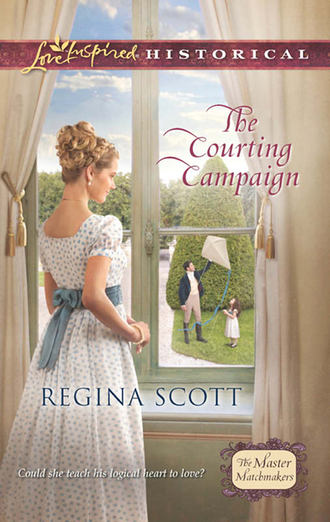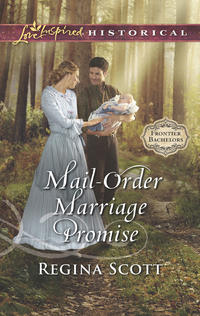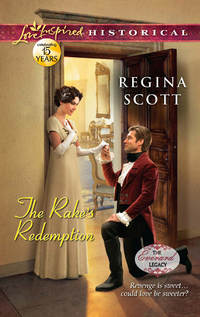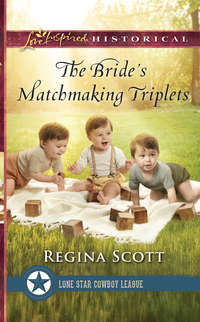
Полная версия
The Courting Campaign
Bell. They could speak of a duke with such familiarity. Even though dukes had been known to sponsor her foster father, she felt the gulf between her and this family widening.
“Then you visit Lady Chamomile often?” Sir Nicholas asked, obviously intent on discovering the truth about the matter.
“Most every day,” Emma assured him. “Isn’t that right, Alice?” She glanced at her charge.
Alice nodded again. “And she sleeps with me at night.”
His black brows shot up.
Mrs. Dunworthy laughed, a silvery sound that surprised Emma. “Oh, Miss Pyrmont, have pity on my overly logical brother-in-law and explain about Lady Chamomile before we perplex him any further.”
He turned his gaze to Emma’s, dark, directing. Oh, but this was too good an opportunity to forego. Emma offered him her sweetest smile. “Lady Chamomile,” she said obligingly, “is a very grand lady and Alice’s favorite doll. We shall have to introduce you to her, Sir Nicholas. Perhaps you could join us for tea, tomorrow.”
She had only meant him to spend more time with Alice, but Emma knew she’d overstepped her position again by the way Mrs. Dunworthy’s smile faded.
“I hardly think that’s necessary,” the lady said.
Emma swallowed and dropped her gaze to her plate. “Forgive me. I meant no disrespect.”
“No offense taken,” she heard Sir Nicholas say, and she wasn’t sure if he was speaking to her or his sister-in-law. “I only regret my work keeps me so busy that I must decline your invitation to join Alice and Lady Chamomile.”
Alice sighed.
Emma’s hand clenched on her fork, and she could not bring herself to pick up a mouthful of the meal. Too busy! He was too busy to spare his daughter a moment for tea. What was so important?
It wasn’t material need that motivated him—the amount of silver, from the cutlery to the candelabra, said the Rotherfords had more than enough income. He didn’t seem to be studying anything that would immediately save lives, like Dr. Beddoes and Mr. Davy used to do at the Pneumatic Institute in Bristol, where they used gases to help people fight off consumption. He didn’t even seem to have a sponsor or patron who expected results from an investment; at least she’d heard no word of it in the servants’ hall. Why couldn’t he find time for Alice?
“As I cannot join you tomorrow,” he continued, obviously unaware of her frustration, “perhaps you could be so good as to answer a few questions now.”
Her anger melted as quickly as it had come. This was what she had feared. Emma swallowed though she’d eaten nothing. “Questions?” She glanced up at him.
His warm smile would have assured her in other circumstances. Now she thought it stemmed from having something else to observe and study. “Yes. A very wise woman recently suggested that I should know more about the person who cares for my daughter.”
He meant to learn all about her. That was the way of natural philosophers. Still, she could hardly blame him. After all, she’d been the one to exclaim over the fact that he didn’t know his daughter’s nanny.
“I like Nanny,” Alice announced. She took a big bite of asparagus and made a face.
Mrs. Dunworthy seemed equally prepared to defend Emma. “I assure you, Nicholas,” she said, “I reviewed Miss Pyrmont’s credentials thoroughly before I employed her.”
“I’m certain you did,” he replied with a nod of approval, slicing through his lamb with brisk efficiency. “I’d merely like to hear about them myself.” Before his sister-in-law could argue further, he turned to Emma. “For instance, Miss Pyrmont, where were you born? Where were you raised?”
He could not know the position in which he had placed her. When Mrs. Dunworthy had made her nanny, the lady had ordered Emma not to speak of her background.
“There are some in this household,” Mrs. Dunworthy had said then, looking down her long nose, “who will never appreciate the plight of an orphan. I would prefer not to burden you with their disdain.”
Was Sir Nicholas one who would judge her? She glanced at her mistress for guidance, but Mrs. Dunworthy’s gaze was fixed on her brother-in-law, and her mouth was set in a tight line. It was up to Emma. She took a breath and told him the truth.
“I’m an orphan, Sir Nicholas,” she admitted. “I don’t remember much about my parents. I was a fosterling at the asylum in London.”
She thought she might see curiosity or dismissal in his gaze, but his look softened. “I’m sorry. It couldn’t have been easy to find a proper place in the world with that start. I commend you for rising above it.”
Tears threatened, and she dropped her gaze to her plate once more. I’m only here because of Your grace and strength, Lord. I know that. Thank You!
“Do try some of the trout, Miss Pyrmont,” Mrs. Dunworthy said kindly. “It’s quite good.”
Emma knew. An angler brought fresh fish to the Grange almost daily. Mrs. Jennings made sure they all ate well. Did Mrs. Dunworthy think otherwise, or was she giving Emily time to compose herself?
“London is a long way from Derby,” Sir Nicholas said to Emma as if his sister-in-law had never spoken. “How did you come to find yourself here?”
“Because she answered my advertisement in the newspaper, of course,” Mrs. Dunworthy said. It was the truth. Emma had asked to read her previous master’s discarded newspapers before they were used for cleaning. The request for a nanny all the way up in Derby had been a Godsend, for it took her far from all those who might seek to bring her back under control.
“So you were looking for a better position,” he surmised.
Emma nodded and was thankful that the maids entered just then to clear the first course and bring in apple pie, trifle and ice cream. Alice started squirming again.
Emma didn’t think Sir Nicholas would let the matter drop, so she wasn’t surprised when he took up his questioning again the moment the maids left.
“Why Derby?” he pressed, spooning up a bite of trifle and holding it before him.
“Oh, Nicholas,” Mrs. Dunworthy said with a sigh, “stop quizzing the girl!”
“I merely wish to know her better,” Sir Nicholas protested. “Alice’s recommendation carries great weight with me,” he smiled at his daughter, “but a gentleman needs to deal with facts.”
Of course. Facts, never feelings, were what a natural philosopher relied on. He had to observe, chronicle. The well-being of his subject was never a consideration.
Well, if it was facts he wanted, she could certainly provide them.
“Allow me to elaborate, then,” she said, setting down her own spoon. “I had three younger foster brothers of whom I was given charge when I was nine, so I’ve more experience than you might expect caring for children. All of us were adopted by a gentleman in London, and I was given care of his two daughters, as well. I attended all the same lessons they did, so I know how to read and write in English and some Latin, and I’m good with numbers. Immediately before coming here, I worked for an apothecary and his family, where I learned a bit about diseases and how to prevent and cure them.”
“Exceptional,” he said, and she sat a little taller. Alice sat up, as well. Emma thought even Mrs. Dunworthy looked a little more confident about the outcome of this conversation.
Until he said, “Who taught you Latin?”
He had to pick that one. She should have left it out, but some part of her had wanted to impress him.
“Nicholas,” Mrs. Dunworthy said, “you are starting to browbeat the girl. Miss Pyrmont has volunteered her accomplishments. Be happy with that and enjoy the rest of your meal.”
His smile of apology was more like a grimace. “Very well, Charlotte. Forgive my inquisitive nature, Miss Pyrmont. It is part and parcel with the way I work, I fear.”
She thought her smile was just as strained, for she very much feared the same thing.
Mrs. Dunworthy began asking Alice questions, then, and as they chatted, Emma found herself watching Sir Nicholas. Much of his food remained untouched on the plate, his long-fingered hands resting on the tablecloth beside it. His right hand was twitching, one finger beating time on the damask to sounds only he could hear. Though he answered any question put to him readily, his gaze no longer focused on the people around him. His body was present in the room, but his mind had already wandered.
Anger pricked her. Alice deserved a father who would love her. Emma was certain they existed; she’d read about them. In fact, as soon as she’d learned to read, she’d devoured stories about families. In the books she loved, fathers were kind and wise, and mothers firm but loving. Men and women married because they were deeply in love, enough to overlook all fault of upbringing or misfortune. As an orphan, Emma had been denied such a family. Why should Alice face the same fate, when her father was very much alive?
Alice said something clever, and Sir Nicholas smiled in obvious appreciation. For a moment, his gaze lit on his daughter, and those analytical eyes warmed, his angular features relaxed. In fact, he had rather expressive lips, the bottom more full than the top. Now they smiled in such a way as to cause a hitch in her breath.
Emma blinked. Why, it seemed he had potential! Perhaps he’d invited Alice to dinner for more than a chance to question Emma. Perhaps he truly cared about his daughter.
What if she could encourage him? What if she could bring him and Alice closer? Mrs. Jennings seemed to think he needed a mother for his child. Perhaps what he really needed was to learn how to be a father.
She smiled as she attacked her apple pie with enthusiasm. She knew exactly how to solve Mrs. Jennings’ problem, and her own. She would indeed start a campaign to court Sir Nicholas, for his daughter.
* * *
Nick was surprised to hear the clock on the mantle chime eight even as they finished the last of the second course. It appeared dinner had passed more quickly than it usually did.
Alice yawned.
Miss Pyrmont smiled at her. “I think perhaps we should make our curtseys, Miss Alice.”
Alice giggled. “You don’t have to miss me. I’m right here!”
Her nanny’s smile grew, and Nick knew his must match it. “Miss Pyrmont is right, Alice,” he said. “It’s time for bed.” He rose and pulled out her chair so she could climb down. Those violet-colored eyes, so like her mother’s, met his, and he felt as if someone had taken out his heart and squeezed.
Singular sensation. Singular thought.
“Good night, Papa,” she said.
Throat surprisingly tight, Nick bowed to her. “Good night, Alice.”
As he straightened, she took Miss Pyrmont’s hand and turned to Charlotte. “Good night, Auntie! Sleep tight. Mind the bugs and fleas don’t bite.”
He had never thought pink a violent color until it erupted in Miss Pyrmont’s fair complexion.
Charlotte threw down her napkin and pushed back her chair to stand. “Bugs and fleas? In my household?”
Nick barked a laugh and instantly regretted it for Charlotte’s head came up and Miss Pyrmont’s head hung.
“It’s something I learned as a child, madam,” she murmured. “It must have slipped out.”
Alice glanced between the two of them. “I like it. I don’t want the bugs to bite me.”
“Of course not,” Nick assured her. “But I’m certain if any bug even considered entering this house, one look from your auntie would drop him dead in his tracks.”
Charlotte glared at him, but he thought he heard a smothered laugh from Miss Pyrmont.
He bowed to his daughter again and to her redoubtable nanny. “Good night, ladies. Thank you for joining me for dinner. It has been most engaging.”
“Good night, sir,” Miss Pyrmont said and hurried Alice from the room as if her very life was in danger.
Seeing the look on Charlotte’s face, he thought she might be right.
“I apologize, Nicholas,” Charlotte said, picking up her napkin as she returned to her seat. “Of course I knew about Miss Pyrmont’s unfortunate early years, but I had no idea she would share anything so common with Alice. I will discharge her tomorrow.”
Nick stopped himself from sitting. “Discharge her? For a child’s rhyme? Nonsense.”
Charlotte cocked her head. “Then it doesn’t trouble you that we know nothing of her parentage?”
“Hardly. It doesn’t matter what she was when she was born. It matters who she is now. She seems to genuinely care for Alice. Surely that is what Alice needs.”
Charlotte nodded as if satisfied. “Very well, then. She stays. But I will keep a closer eye on her.”
He pitied Miss Pyrmont. “Is that necessary? I seem to recall you saying she came from a good family, though how that’s possible given she’s an orphan, I’m unsure.”
“I meant her foster family, of course,” Charlotte said with asperity. “I knew her foster mother years ago.”
By her tone, he gathered he was supposed to have known this fact. He wasn’t sure why. But then, while Ann had always encouraged his scientific pursuits, Charlotte lacked all appreciation of reasoning, as it seemed she could question nothing, not even herself.
“As Miss Pyrmont mentioned,” Charlotte continued, “her foster family took in her and three boys from the orphan asylum to raise. It was a fine act of Christian charity.”
“So it would seem,” Nick mused, finger tapping his thigh. “Though considering such a background, our nanny seems rather outspoken.”
“She exhibits a certain independence,” Charlotte agreed, and he thought he detected a trace of envy in her crisp voice. “But I don’t think her attitude will infect Alice. She’s too young to understand such things.”
He relaxed his hand. “I rather hope a spark of independence rubs off on Alice. I’d hate for my daughter to grow up an average sort of girl.”
She quirked a smile. “I doubt you’ll have any problem there.”
No, Nick thought as he bowed and left her to her thoughts. His problems at the moment were far bigger, and neither his daughter nor the intriguing Miss Pyrmont could help him solve them.
Chapter Four
Emma took her time settling Alice to sleep that night. The little girl was still wound up after dinner, telling Lady Chamomile all about the food, table settings and conversation. She seemed genuinely delighted with the whole affair. Why, then, had she claimed that Lady Chamomile was so unhappy?
Emma put the question to the girl as she tucked her into the child-sized poster bed in her bedchamber off the main room of the nursery suite.
Alice snuggled deeper under the goose-down comforter. “She is unhappy because she is an orphan.”
The answer cut into Emma. “Not all orphans are unhappy. Some know the Lord has better plans for them.”
Alice sighed, closing her eyes. “That’s good. But I think Lady Chamomile would be happier if we could find her a papa.”
Emma stroked Alice’s silky hair back from her face. “I’ll do all I can, Alice. I promise.”
She started the very next day at Sunday services. Dovecote Dale was served by a fine stone church in the center of the valley. Though the Duke of Bellington had responsibility for it, all four of the wealthy families—the Rotherfords at the Grange, Lord Hascot at Hollyoak Farm, the Earl of Danning at Fern Lodge, and the Duke of Bellington—had endowed gifts so that the little country chapel lacked for nothing. The building and bell tower had a fresh coat of white paint below a gilded steeple. The stained-glass windows glittered in the summer sun.
Inside, carved oak seats marched along the center aisle, and banners in rich silk draped the walls leading up to the alabaster cross. With his flyaway hair and silver-rimmed spectacles, the Reverend Mr. Battersea always seemed in awe of the place, honored to be given charge of their souls.
With the servants from the four estates, Emma listened with her usual interest to the readings and the sermon. But she was careful to be the first one on her feet and the last one to sit when the service called for the congregation to change positions. She wanted to take advantage of every opportunity to observe Sir Nicholas near the front.
From his absorption in his work to the way the staff seemed to revere him, she’d assumed he was a man like her foster father, though certainly not with Samuel Fredericks’s ability to denigrate those he saw as lesser beings. She was fairly sure her foster father was in a class by himself in that area. Mr. Fredericks attended church in his finest clothes, arriving in his best carriage. He worshipped with head high and shoulders broad, as if he wanted everyone around him to notice or he saw himself as a peer of the Lord instead of a humble penitent.
Sir Nicholas was different. Oh, his clothes were of fine wool and soft linen, but they were a bit on the rumpled side, and his cravat was more simply tied than that of Mr. Hennessy, the butler from the Earl of Danning’s lodge. Though she never saw Sir Nicholas pick up the Book of Common Prayer to follow the service, his lips seemed to be moving in the appropriate responses. Yet she detected little change in him, as if he were merely doing what he’d done a dozen times before.
Lord, what am I to make of this man? Last night I thought I saw a glimmer of a good father. But if he cannot give his heart to You, how can he give it to his daughter?
She received the beginning of an answer that afternoon, at the weekly Conclave.
Once a month, each member of the household received a Sunday afternoon off. She and Mrs. Jennings had the same day, and the cook had quickly introduced Emma to the place the servants gathered at the Dovecote Inn, not far from the church. The inn was a rough-stone building with flower boxes under the windows. More boxes under the overhanging eaves made homes for the doves for which the area was famous. On the upper floor lay a large private dining room, and it was there every Sunday afternoon that some collection of the local servants met to celebrate or commiserate their lots.
Some of the other houses, Emma knew, were more generous, so a few of the Conclave attendees like Mr. Hennessy were there nearly every Sunday. Others, like her, came once a month. Someone usually brought the largess of a master’s table—today it was fresh apricots from Lord Hascot’s orchard. And there was always tea and talk around the polished wood table.
The last time Emma had attended she’d brought her knitting and sat quietly on one of the tall upholstered chairs by the window, listening to the talk around her and the coos of the doves outside. She’d noticed that the unmarried servants tended to flirt with each other. She paid them no mind, as they didn’t seem to be serious.
Today, she had another purpose anyway, so she chose a seat near the stone hearth and confessed her goal to Mrs. Jennings.
“God bless you, Miss Pyrmont,” the cook said, face brightening. “You can count on my help—anything you want.”
“I’m trying to think of an activity Sir Nicholas could do with Alice,” Emma explained, edging forward on her seat as the other servants milled around them. “Something that might encourage him to forget his work for a time. You’ve known him for years, haven’t you? What did he like to do as a child?”
“Read,” Mrs. Jennings answered promptly, brushing back her skirts from the glowing fire. “Everything and anything. He knew the Latin names for things by the time he was Miss Alice’s age, and he knew most of the Gospels by heart by the time he was eight. He liked Luke the best. Said it had more facts.”
Of course. She’d suspected he set a great store by facts. And perhaps that was why he’d felt no need to use the Book of Common Prayer. He might well have memorized that, too! She studied the apricot she’d plucked from the bowl. “Did he have any favorite toys? Good friends?”
“Any so-called friends he found at Eton and lost in London,” the cook replied tartly. “But I’ll not gossip.”
“I will,” Dorcus said, ambling closer. The maid also had the afternoon off, but Emma had noticed she’d spent her time batting her eyes at a strapping footman from the duke’s household. “You should know what’s what, Miss Pyrmont,” she said now, pulling up a chair to sit beside Emma and the cook, “especially if you mean to become mistress of the Grange.”
“I have no such intentions,” Emma informed her, biting into her apricot to forestall additional comment. As if she’d ever consider marrying a man like Sir Nicholas! Her ideal husband would value his family, put their needs first.
“The more fool you, then,” Dorcus replied. “Being called a cheat never colored a fellow’s money.”
“That’s quite enough from you,” Mrs. Jennings declared. “Sir Nicholas is no cheat. If he says he made the right calculations, then he did.”
Dorcus rolled her eyes, but she rose and returned to her pursuit of the footman.
The cook leaned closer to Emma and lowered her voice. The warm scent of vanilla washed over Emma. “Never you mind her. All you need to know is that some of those philosophers questioned Sir Nicholas’s work. He left London because of it and gave himself completely over to his studies. All the more reason for you to carry on with your plan. And as for toys, he was quite partial to kites. Seems he’d read about some experiment by an American gentleman and was keen to repeat it.”
Kites, eh? Oh, for a windy day! But lacking that, surely there was something she could use from Mrs. Jennings’s stories.
Emma’s mind began to conjure up any number of activities designed to woo Sir Nicholas away from his work. She would have loved to speak further with the cook, but she could see Dorcus casting them looks. Best not to fan that flame. Emma thanked Mrs. Jennings and made polite conversation with the other servants until it was time to return to the Grange.
So, Sir Nicholas had studied from an early age, she thought as she walked up the lane from the village, the sun warm on her dark wool gown. Again, she wasn’t surprised. Indeed, the only surprising thing about her discussion with Mrs. Jennings was the reason Sir Nicholas found himself rusticating in Dovecote Dale.
His scientific calculations had obviously incensed his fellow natural philosophers to the point that he no longer felt comfortable among them. He must have made a tremendous mistake indeed. In her experience, it took a great deal to convince learned men to castigate their colleagues. Certainly she’d wished someone in authority to berate her foster father for his inhumane practices. But it seemed experimenting on children did not rise to the level of offense among the Royal Society.
There, she was starting to sound bitter again. She could feel her emotions like acid on the back of her tongue. One of the reasons she’d wanted to escape London was to leave her past behind, before those emotions poisoned her outlook, her hopes and her future. She was not about to give in to them now.
Help me, Lord. I know You must have sent me here for a reason. Show me the good I can do. Help me be a blessing.
Her own blessing was waiting for her on her return. In fact, Emma heard laughter before she reached the nursery.
As she paused in the doorway, she saw that Ivy was chasing the little girl around the table, her blue skirts flapping. Alice giggled each time she managed to evade capture. Ivy stopped immediately on seeing Emma, tugging down her apron and adjusting her lace-edged cap.
“Begging your pardon, miss,” she said, with a quick curtsey to Emma, “but someone would refuse a tickle.” She glanced pointedly at Alice, who covered her mouth with both hands. The giggle still slipped out.
Emma ventured in. “Tickles before dinner? What am I to do with the pair of you?” She clucked her tongue with a smile.
Alice dropped her hands and hurried to the table, slippers skimming the rosy carpet. “Do you wish a tickle, too, Nanny?”
Now Ivy giggled before a look from Emma sent her hurrying out to help Mrs. Jennings finish the Sunday dinner.
“Not at the moment,” Emma assured her charge. “And I’m guessing the rest of the household is not up to laughter either on a quiet Sunday evening.”







